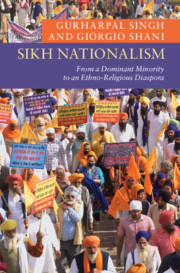‘This is a magisterial work that will be a reference point for many years. The authors show that Sikhs are so much more than a faith community. Using a wide array of social and political theory, they have carefully fashioned a comprehensive understanding of Sikhs as an ethnicity, a nation and a minority with a distinctive diaspora.’
Robin Cohen - University of Oxford
‘This well researched and elegantly written book provides the most complete account to date of the complexities of Sikh nationalism. It explores the historical background, the influence of diaspora communities and the intersection of religion, ethnicity and politics. This authoritative study is a benchmark in the study of South Asian socio-politics, globalised religious communities and the contemporary rise of religious neo-nationalism throughout the world.’
Mark Juergensmeyer - University of California
‘This is an exciting study that seeks to go beyond religion and territory. Singh and Shani masterfully map out the ever-shifting historical, political, economic, social, and cultural terrain of Sikh nationalism. In doing so, they offer a nuanced reading of the unfolding of critical events and their complex interconnections, both internal and exogenous, in colonial, postcolonial, contemporary Indian politics and diaspora settings. The authors address difficult questions of whether the Sikh case as an identity-driven nationalism in the throes of modern globalism seeks separatism or multiculturalism, long-distance nationalism or de-territorialisation. As the dynamic past of the minority Sikh religion intersects with the robust Sikh global diaspora today, new possibilities of imagining Sikh futures open up. We have here a most informative, accessible and provocative resource.’
Nikky-Guninder Kaur Singh - Colby College
‘This is a major study of the Sikhs, who can be variously framed as a world religion, a nation and a religious minority. Theoretically sophisticated and empirically rich, it offers a provocative thesis about the deterritorialisation of contemporary nationalisms.’
John Hutchinson - London School of Economics
‘The resilient nationalism of “small peoples” in South Asia has been overlooked. This book outlines the turbulent history of the Sikhs from their past regional ascendancy to the grim aftermath of the partitionist creation of India and Pakistan, and takes us onward to the present, wrapping in an account of Sikhdom beyond its homeland. This study will be of general interest to students and scholars of nationalism, ethnicity and diasporas. Singh and Shani are to be commended for their synopsis.’
Brendan O’Leary - University of Pennsylvania
‘In a clear and insightful analysis, the volume reveals the centrality of the Sikh question to the division of India in 1947 and the contemporary politics and international relations in South Asia. This thoughtful study will be essential reading for scholars and students of South Asia.’
Ian Talbot - University of Southampton
‘Gurharpal Singh and Giorgio Shani meticulously review the historical and sociological literature on the development of self-awareness and self-empowerment of Sikhs to assess the complex issue of ethnic, religious, and racial topics associated with Sikh nationalism. Their study is a rich and reliable source of information about nationalism in India and worldwide concerning the intersection between religion and state(s).’
Othmar Gächter
Source: Anthropos
'Gurharpal Singh and Giorgio Shani’s book is a major contribution to the study of Sikh nationalism and the nationalism of so-called 'small peoples' -that is, ethnic groups or 'nations' without their own sovereign states. The book makes important area studies and theoretical/comparative contributions to the existing academic literature on the topic. The book’s easy-to-read analytic narrative makes it accessible to the general educated audience, as well as the more specialized academic community … The product is a magisterial academic study of the historical evolution of Sikh nationalism, which deserves the attention of area studies experts and comparativists alike.'
Jugdep Singh Chima
Source: Pacific Affairs
‘The volume is not only informative, but accessible and is especially timely given the contemporary rise of religious nationalism. The work is both an important contribution to scholarship and an extremely useful teaching text. This is not an easy combination to achieve … It is lucid, accessible and will form essential reading for scholars and students of South Asia and more widely of nationalism, ethnicity, and diasporas for the foreseeable future.’
Ian Talbot
Source: Sikh Formations
‘Shani and Singh’s work represents a contribution to the literature on Sikh nationalism that is unparalleled in its detail and comprehensiveness … Scholars of comparative nationalism and those seeking to understand the historical roots of contemporary nationalisms in South Asia should take the detailed account of this volume to heart.’
Ishmael Ali Maxwell
Source: Nationalism and Ethnic Politics
'… well-researched and densely crafted … This book makes a valuable contribution to the understanding of the Sikhs and their changing searches for identity and homeland.’
Harihar Bhattacharyya
Source: Regional & Federal Studies
'… an excellent resource … indispensable to researchers, scholars and lay readers seeking to gain a deeper understanding of Sikh nationalism, from its inception to the second decade of the twenty-first century.'
Kamalpreet Singh Gill
Source: International Quarterly for Asian Studies
‘… the inherent value of this work makes it an important addition to any serious collection on Sikh history … Recommended.’
P. P. Barua
Source: Choice
'In this highly readable and well-researched volume, the authors persuasively draw on theories of ethnicity and nationalism to understand the cultural roots of Sikh nationalism and the several ways it has transformed since the nineteenth century … This book is requisite reading for anyone seeking to understand the rise of radical Sikh politics and the various influences under which they developed in the subcontinent and abroad.’
Carol Christine Fair
Source: The Journal of Asian Studies



